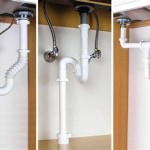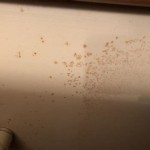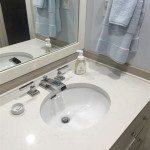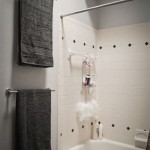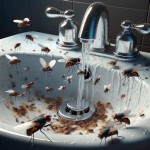Why Does My Bathroom Smell Wet and Dry?
The bathroom, a space designed for hygiene and cleanliness, can sometimes become a breeding ground for unpleasant odors. A wet and dry smell, often described as musty or stale, can linger in the air, making the bathroom an unwelcoming environment. This perplexing combination of scents arises from a multitude of factors, each contributing to the overall olfactory experience. Understanding these contributing factors is crucial for identifying the source of the odor and implementing effective solutions for a fresh-smelling bathroom.
Moisture and Dampness
Moisture is a key culprit in the development of wet and dry smells. Bathrooms naturally experience high levels of humidity due to showering, bathing, and other water-related activities. When this moisture cannot evaporate properly, it creates a breeding ground for bacteria and mold, leading to a musty odor. This dampness can permeate surfaces, including walls, floors, and even towels, further exacerbating the issue. Lack of proper ventilation, such as inadequate exhaust fans or closed windows, can trap moisture and exacerbate the problem. The presence of leaks, whether from faucets, pipes, or showerheads, can also contribute significantly to the wet smell.
Organic Matter and Bacteria
The presence of organic matter, such as hair, skin cells, soap residue, and even dust, can contribute to the dry smell. These materials decompose over time, releasing unpleasant odors. Bacteria flourish in moist environments, amplifying these unpleasant smells as they break down the organic matter. Poor cleaning habits, leaving these materials to accumulate, and infrequent cleaning of surfaces can also worsen the odor.
Ventilation and Air Circulation
Ventilation plays a crucial role in preventing the build-up of odors and maintaining a fresh bathroom environment. Adequate ventilation removes moisture and airborne particles that cause unpleasant smells. However, insufficient ventilation can lead to a build-up of odors, creating the distinct wet and dry smell. This can be exacerbated by poor air circulation, particularly in smaller bathrooms with limited air movement. It is essential to ensure proper functioning of exhaust fans and to open windows for natural ventilation whenever possible.
Mold and Mildew
Mold and mildew thrive in damp environments, contributing significantly to the musty and stale smell. These fungi release spores that can irritate the respiratory system and trigger allergies. They often grow in hidden areas, such as behind walls, beneath sinks, or in shower curtains, making them difficult to detect and eliminate. Once established, mold and mildew can be challenging to remove, requiring specialized cleaning products and potentially professional remediation.
Sewage System Issues
In some cases, the wet and dry smell may originate from the sewage system. Broken pipes, leaking drains, or a faulty sewer line can allow sewer gases to escape into the bathroom, resulting in a pungent, foul odor. This smell can be particularly strong in areas near the toilet or shower drain. It is important to address these issues quickly as they can pose health risks and cause damage to the plumbing system.
Cleaning and Maintenance
Regular cleaning and maintenance are paramount in preventing and eliminating bathroom odors. Thoroughly cleaning surfaces, including floors, walls, and the shower, helps reduce the accumulation of organic matter and bacteria. Cleaning with disinfectant solutions can further eliminate odor-causing microorganisms. It is essential to address areas prone to moisture build-up, ensuring that these spaces are properly dried and ventilated. Regular cleaning of showerheads and drains can prevent the build-up of mineral deposits and clogs that can trap moisture.
Other Factors
Other factors can contribute to the wet and dry smell in the bathroom, including the age of the home, the type of building materials used, and even personal hygiene habits. Older houses may have plumbing systems that are more prone to leaks or clogs, while certain materials, such as wood, can be more susceptible to absorbing moisture and odors. Individuals with strong body odor may perceive the bathroom as smelling wet and dry, even if it is relatively clean.
Addressing the wet and dry smell in the bathroom requires a multifaceted approach. Identifying the source of the odor, whether it be moisture build-up, organic matter, or a plumbing issue, is crucial. Implementing effective cleaning practices, ensuring proper ventilation, and addressing underlying issues such as leaks or mold growth are important steps towards achieving a fresh and odor-free bathroom environment.

Why Is There A Bad Smell In My Bathroom M J Burt

What Causes Bathroom Drains To Smell

Help My Bathroom Smells Musty What Should I Do Phyxter Home Services

New Bathroom Smells Musty Causes And Solutions

4 Common Causes Of A Stinky Shower Nj Bathroom Remodeling Renovation

Help My Bathroom Smells Musty What Should I Do Phyxter Home Services

Five Reasons Your Bathroom Smells Like A Sewer The Plumbette

How To Eliminate Smell From Bathroom 10 Simple Ways

Why Your Bathroom Sink Drain Smells
:strip_icc()/DesireeBurnsInteriors-faf22b15a1df4b8aae0bcf6c98ded97e.jpg?strip=all)
How To Make Your Bathroom Smell Good
Related Posts

